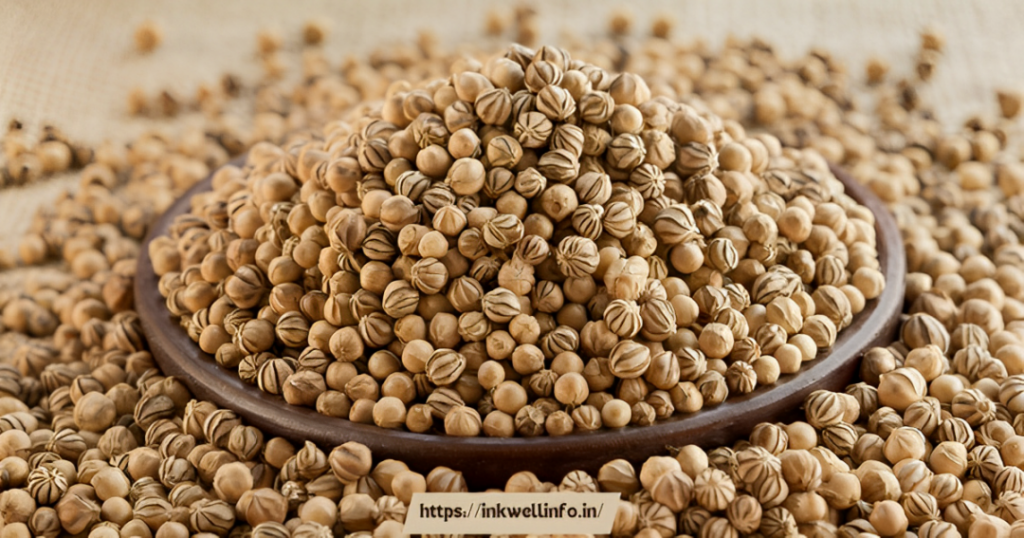Coriander seeds, often overlooked in the spice cabinet, are not just ingredients that add flavor to food but also play a significant role in health and wellness. These tiny seeds are a powerhouse of nutrition, with benefits extending beyond the kitchen. From culinary delights to traditional remedies and even skincare solutions, it hold an esteemed place in both ancient customs and contemporary practices. Their importance as a holistic health ingredient is undeniable!
1. What Are Coriander Seeds?
Coriander seeds are the dried fruits of the coriander plant (Coriandrum sativum). This plant is often found in gardens and has a dual identity; it gives us the fresh herb known as cilantro, as well as the earthy, aromatic seeds. While leaves, and ground coriander powder all come from the same plant, they offer different flavors and uses.
- Coriander Leaves (Cilantro): Bright and fresh, used as a garnish or in salads.
- Coriander Seeds: earthy, citrusy, and slightly nutty, ideal for cooking and baking.
- Ground coriander powder: A fine powder made from crushed seeds, commonly used in spice blends.
2. Culinary Uses of Coriander Seeds
It can be used in numerous ways in the kitchen. Here are some popular methods to incorporate them into your meals:
Whole vs. Ground
- Whole Seeds: When cooked whole, coriander seeds release their flavor gradually, which is perfect for longer dishes like stews or slow-cooked meats. Tossing a few whole seeds into a pot can give your dish a subtle warmth.
- Ground Seeds: Grinding it transforms them into a fine powder, making them ideal for quick incorporation into recipes. Ground coriander is often added to spice blends and can elevate the flavor of dips, dressings, or even baked goods.
Flavor Combinations
They are friends with many flavors. They pair well with:
- Cumin: A common combination in many spice mixes, giving depth and warmth.
- Turmeric: Often used together in South Asian dishes, enhancing both color and health benefits.
- Ginger: This duo refreshes salads and Asian stir-fries, bringing brightness to each bite.
They are crucial in different culinary traditions:
- Indian Cuisine: Common in curries and spice mixes.
- Mexican Cuisine: Key ingredient in salsa and marinades.
- Middle Eastern Cuisine: Found in dishes like dukkah and za’atar.
Quick Recipe: Coriander Seed Tea
- Boil 2 cups of water.
- Add 1-2 teaspoons of crushed coriander seeds.
- Simmer for 5 minutes, strain, and enjoy!
“Think of cooking with coriander seeds as hosting a fun dinner party with all your favorite flavors!”
3. Nutritional Profile of Coriander Seeds
They are not just tasty; they are packed with nutrients! Here’s a breakdown of their key components:
- Fiber: Aids in digestive health.
- Antioxidants: Help neutralize free radicals.
- Vitamins:
- Vitamin C: Supports immune function.
- Vitamin K: Essential for blood clotting.
- Minerals:
- Calcium: Important for bone health.
- Iron: Necessary for blood production.
- Magnesium: Supports various bodily functions.
These nutrients contribute to overall health, making coriander seeds a fantastic addition to any diet!
| Nutrient | Coriander Seeds | Cumin Seeds | Fennel Seeds |
| Fiber | 41% DV | 39% DV | 39% DV |
| Antioxidants | High | Moderate | Moderate |
| Calcium | 9% DV | 5% DV | 2% DV |
| Iron | 15% DV | 8% DV | 4% DV |
| Magnesium | 10% DV | 18% DV | 5% DV |
4. Health Benefits of Coriander Seeds
Beyond their incredible flavor, it offer several health benefits that make them a great addition to your diet.
Nutritional Value
They are rich in antioxidants, vitamins, and minerals. They contain:
- Vitamin C: Great for the immune system.
- Iron: Boosts your red blood cells.
- Magnesium: Supports muscle and nerve function.
- Regulating Blood Sugar: They may help manage diabetes by stabilizing blood sugar levels.
- Supporting Heart Health: It can lower cholesterol and improve circulation.
- Anti-inflammatory Properties: Beneficial for easing arthritis and joint pain.
- Promoting Skin Health: Helps combat acne and can enhance complexion.
Digestion Aid
One of the best aspects of it is its impact on digestion. They are known to help with:
- Reducing bloating: A sprinkle can ease discomfort after a heavy meal.
- Soothing indigestion: Chewing on a few seeds can provide relief.
“A little pinch of coriander seeds can go a long way in making your meals more digestible and enjoyable!”
5. How to Store and Buy Quality Coriander Seeds
Proper storage is crucial to maintain the freshness and flavor of coriander seeds. Here are some tips:
Storage Tips
- Cool, dark place: Keep them in a cool cupboard away from direct sunlight.
- Airtight Containers: Store them in airtight jars to prevent moisture and air from spoiling their quality.
- Periodically Check: While dried seeds last a long time, check for freshness every few months. Old seeds may lose their potency and flavor.
Buying Guide
- Quality Selection: Look for organic, fresh, and aromatic seeds.
- Where to Buy: Trusted sources include local spice shops and various online retailers.
6. Medicinal Uses of Coriander Seeds
Traditionally, coriander seeds have been used in herbal medicine.
- Remedies for Digestion: They can help alleviate nausea and gas.
- Detoxifying Drinks: Good for kidney and liver health.
Common Remedies
- Coriander Seed Water for Weight Loss:
- Soak 1 teaspoon of coriander seeds in water overnight.
- Drink the water on an empty stomach in the morning.
- Coriander Tea for Cough and Colds:
- Steep 1 teaspoon of seeds in hot water.
- Drink twice a day for relief.
7. How to Use Coriander Seeds in Daily Life
For Cooking
- Grinding: Use a spice grinder to make fresh coriander powder.
- Toasting: Toast seeds in a dry pan to enhance their flavor before grinding.
For Health
- Detox Drink Recipes: Mix coriander water with lemon and honey for an added health boost.
- Infusions and Teas: Incorporate into daily teas for health benefits.
For Skincare
- DIY Face Masks: Mix ground coriander seeds with yogurt for a refreshing face mask.
8. Growing Coriander Seeds at Home
If you have a green thumb (or even if you don’t), growing coriander can be a rewarding experience! Here’s how to get started:
Planting
- Choose a sunny spot in your garden or a pot that gets at least six hours of sunlight.
- Sow seeds in well-draining soil, about ½ inch deep. Water regularly, but be careful not to over-water!
Harvesting
It’s time to harvest the seeds once the plants flower and the leaves start to wilt. Cut the seed heads and place them in a paper bag to dry. Once completely dry, shake the bag to collect the seeds—there’s something so satisfying about this process!
9. Potential Side Effects and Precautions
While coriander seeds are generally safe, be aware of the following:
- Allergic reactions: Some may experience skin rashes.
- Overconsumption risks: Excessive intake can lead to digestive issues.
- Pregnancy Precautions: Always consult a healthcare professional before using herbal remedies if pregnant or have existing health conditions.
10. Fun Facts About Coriander Seeds
- Global Popularity: Did you know that coriander is used in cuisines across the globe? From Indian Dal to Middle Eastern spice mixes, it transcends cultural boundaries.
- Herb vs. Spice: The leaves of the coriander plant are known as cilantro and are just as popular! In contrast, the seeds provide a different flavor profile that many find addictive.
Frequently Asked Questions (FAQs)
1. What are the health benefits of coriander seeds?
Coriander seeds aid digestion, boost immunity, and support heart health.
2. How do you use coriander seeds for weight loss?
Drinking coriander seed water can support weight loss efforts.
3. Can you eat raw coriander seeds?
Yes, but they are typically used dried and ground for better flavor.
4. What’s the difference between coriander seeds and ground coriander?
Coriander seeds are whole, while ground coriander is derived from crushed seeds, offering a different texture and intensity.
5. How long can coriander seeds be stored?
When stored properly, they can last for 2-3 years.
Closing Thoughts
Coriander seeds are a delightful addition to your kitchen pantry. Their unique flavor, health benefits, and versatility can elevate any dish. Plus, growing your own coriander can be a fun and rewarding hobby.
Next time you’re making a dish, consider adding some coriander seeds to the mix—your taste buds might just thank you! And why not share your favorite coriander recipes or tips in the comments? Let’s keep the flavor conversation going!
For More Visits; INKWELLINFO.IN




Pingback: Image Submission | Pearltrees